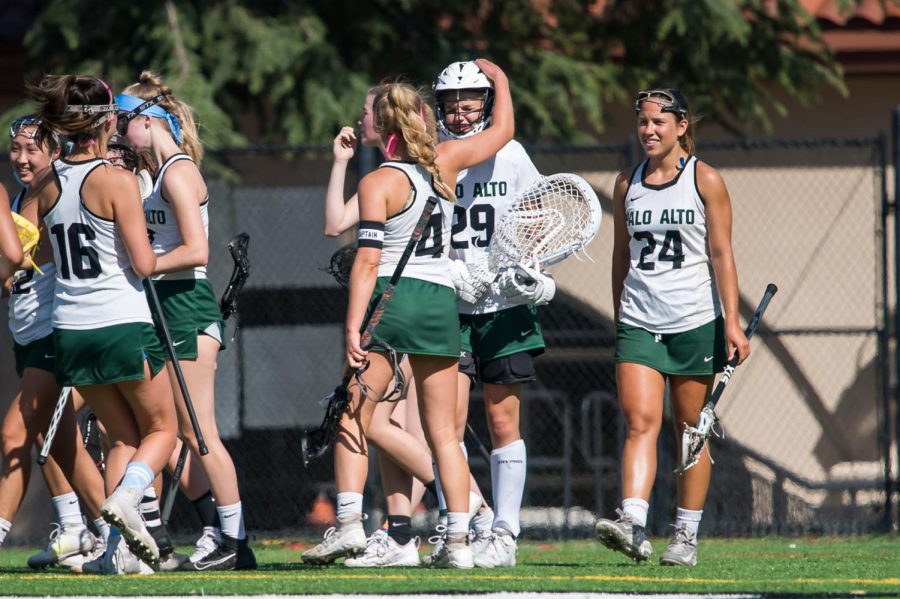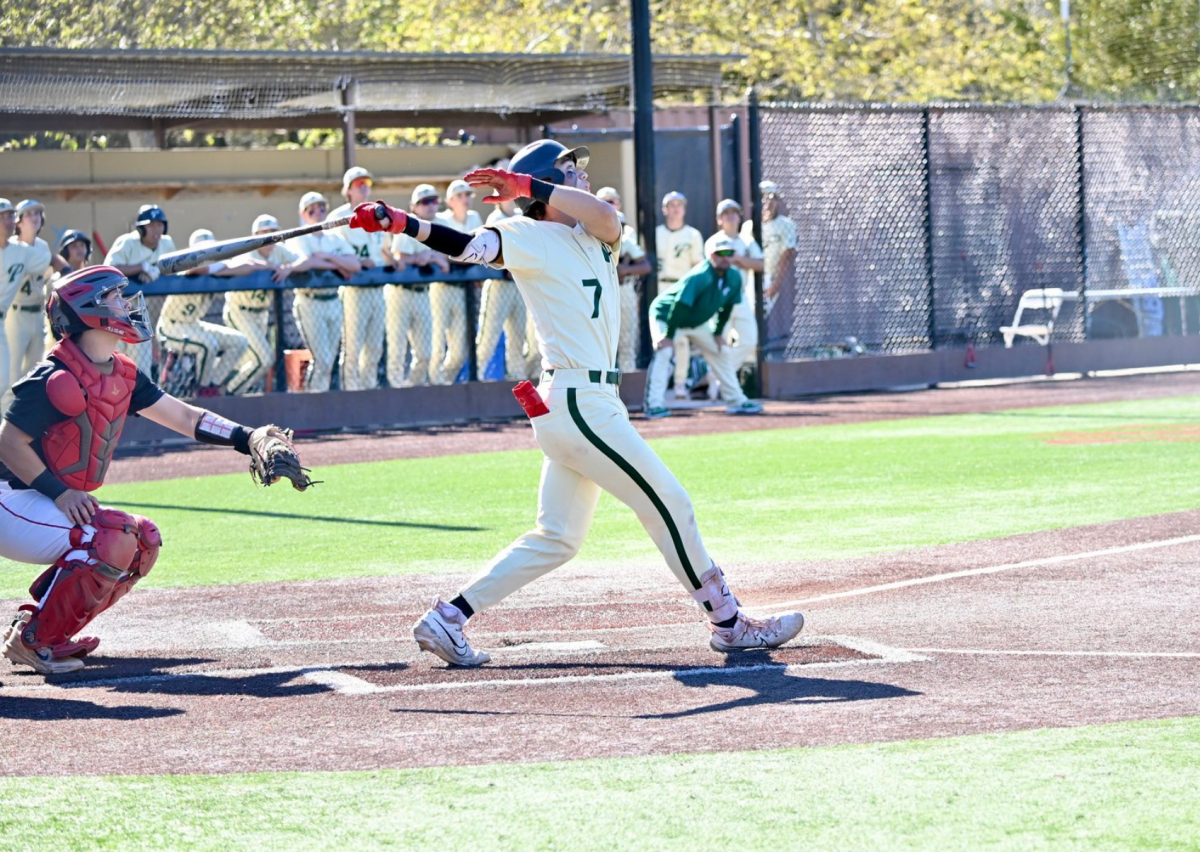True passion
December 12, 2014
Shawn Johnson began gymnastics at the age of three. Ryan Lochte first learned to swim at age five. Abby Wambach dribbled her first soccer ball at the age of four. Since then, they have spent innumerable hours working towards greatness. Their efforts have earned them a place in history. Their names have become recognized internationally, making them role models for young athletes.
Despite the fact that starting at a young age has gotten famous athletes to where they are today, recently, there have been many pediatric studies that show children are choosing to narrow their activities down to a single, year-round sport from younger and younger ages. One such study was conducted by the American Academy of Pediatrics. It stated that early specialization tends to be done in hopes of excelling and eventually reaching college or even professional levels, and also raised concerns about the possible negative effects of such intensity and pressure.
Researchers from the American Academy of Pediatrics have also found that playing a single sport year after year without any other sports to provide cross-training can increase injury rates, especially among younger children who are still growing. The study was written by Neeru Jayanthi, MD.
“The young athletes who more intensely specialized in a single sport were more likely to have an injury and a serious overuse injury,” Jayanthi said.
In addition, the lack of any other activities can cause burnout in athletes who might otherwise have thrived and succeeded.
A common misconception with focusing on a single sport is that in order to make it to the highest levels of competition, one must dedicate their life to the sport from as early an age as possible. Instead, studies have shown that participating in multiple activities can promote overall athleticism and increase an athlete’s performance in all of their sports. The greatest difference with playing multiple sports as opposed to just one is that the training for each sport entails learning varied technical skills. General athleticism helps with the rest.
Regardless of whether or not athletes choose to specialize at an early age, sports provide exercise and other vital elements of a healthy childhood. These benefits can extend to the high school years for the individuals who choose to continue with sports.
At the high school level there are generally four main types of athletes: those who specialized in their sport early, those who played multiple sports until they reached high school and were forced to narrow their activities, those who choose to pick up a new sport and those who have managed to continue playing multiple sports.
Regardless of what category an individual falls under, each athlete has a story as to why they chose to play the sport(s) they play.
Halle Biorn (‘16) has played tennis competitively since her freshman year, and exclusively since her sophomore year.
“I chose to play tennis because I love it,” Biorn said. “It’s kind of my escape from everything. When I step on the court, nothing else matters.”
Many athletes feel this way about their sport. Athletics can provide a way to combat the stresses of high school life. They also provide a setting in which one can learn in order to improve and eventually compete at the top levels. An athlete must sometimes narrow their interests down and dedicate all of their efforts to a single sport in order to learn and improve as much as they can. Claire Dennis (‘16) has played volleyball for seven years and quit playing basketball after her freshman year in order to only play volleyball.
“I chose volleyball because I felt like I had better skills [in it] than in basketball and I enjoyed playing with my teammates,” Dennis said. “Also, since [I made] varsity as a freshman, I wanted to continue to improve by committing more time so that I could play more the following season.”
Jade Schoenberger (‘15) has been playing volleyball since sixth grade and currently plays for Paly. Unlike Dennis, she chose to continue with the sport because of the nature of the game.
“I chose to stick with volleyball because I love how quick the game is,” Schoenberger said. “It’s a fast scoring game [and you get] more touches on the ball as well as more opportunities to score.”
There is something about a certain sport that draws an athlete in and keeps them interested over the years. For Schoenberger, volleyball held her attention because of the constant action. For Preston Kuppe (‘15), soccer was what he enjoyed most. Kuppe has played soccer nearly his whole life and although he has tried other sports such as baseball, basketball and lacrosse, soccer has remained his favorite.
“I decided to continue soccer the whole time because it’s the most fun,” Kuppe said. “I would rather go play soccer for three hours than any other sport.”
Lena Chang (‘15) also attempted other sports when she was younger but had a similar experience as Kuppe.
“I personally never really enjoyed any other sport as much as soccer so I just stuck with what I liked,” Chang said.
Most athletes are influenced by their family members and friends in terms of what they choose to play. Livi Musil (‘15) followed in her sister’s footsteps.
“My older sister started playing [soccer] and I wanted to be athletic like her,” Musil said. “I was best at soccer and really liked my teammates and coaches.”
Adrianna Rositas (‘15) was also impacted by her family. She played a variety of sports when she was younger, including cheerleading, boxing and motocross. Now she plays softball for Paly.
“I chose to continue [with softball] because as I grew older motocross involved [fewer and fewer] girls, so my father and I came to an agreement that I should continue in a more [feminine] sport,” Rositas said. “That is when I chose softball because it was also extremely competitive in my eyes.”
Along with gender stereotypes related to sports, as athletes get older, the requirements of school and other activities can force them to make decisions about how to spend their time. Once students get to high school, the competitive academic environment at Paly can highlight the need to limit extracurricular activities.
Maya Benatar (‘16) has played multiple sports since she was little, and eventually narrowed them down to two: lacrosse and soccer. She reached a point where she had to decide which she wanted to continue in high school. Her freshman year, she quit soccer and chose to pursue lacrosse year-round.
“I ended up deciding the sport that I picked up quicker and the sport that I felt I was naturally better at was lacrosse and so I felt like…I would stand out more playing lacrosse than playing soccer,” Benatar said.
There is also the college recruitment element when deciding whether to continue with athletics, and which sport to choose. Many athletes choose to pursue the sport that they feel gives them the best opportunity to play in college. John Carter (‘15) has rowed for five years, the last two being more competitive. Although he also played football and ran track, Carter chose to only focus on crew.
“I decided to stick with [rowing] because I was good at it and enjoyed it,” Carter said. “Also, rowers are highly recruited by colleges.”
Part of what helps a student athlete decide which sport(s) to continue with is the amount of sacrifices asked of them and how many they are willing to make. Sports consume a significant amount of time, both during the week and over the weekend. It becomes a question of how kids want to spend their time, and what is truly important to them.
Trisha Wittenbrink (‘17) currently plays volleyball and soccer and runs track in the spring. She enjoys all of her sports; however, she does find it overwhelming at times.
“In order to play sports and balance school, I don’t have much social time,” Wittenbrink said. “But [that’s] more of a lifestyle that I’m used to, rather than a sacrifice. I’ve been busy since middle school, [which doesn’t leave] me much time to hang out with friends after school. I consider my teammates my best friends and make time for the most important people in my life. Student athletes have a constant balancing act of school, sports and social life. You have to have priorities and know what you have time for and what you don’t. Time is precious.”
Biorn agreed that sports require giving up certain aspects of one’s social life, and friends are a lower priority.
“There [are] times where I can’t go out because I have a match early the next morning,” Biorn said. “[Sometimes] I miss events [or] hanging with friends because I have a tournament.”
There is also the sometimes inevitable requirement of giving up other activities in order to pursue one more competitively. Benatar reflected on having to choose lacrosse over soccer.
“Giving up soccer was hard,” Benatar said. “I loved playing soccer and I could’ve played for Paly, which would have been a lot of fun, but honestly I think it was worth it [to stop] because I think you just have to choose what you’re better at and what you like doing more.”
Once an athlete has chosen which sport(s) they want to focus on, their life transitions from a variety of activities to a seemingly simpler balancing act between sports, school and friends and family. However, as one gets older, each aspect of this balancing act seems to require more and more commitment. For most high school athletes, sports have a large impact on other areas of their lives. Kuppe stated that playing Paly soccer can interfere both with schoolwork as well as with vacation time. The team practices over the Thanksgiving long weekend and games start over winter break.
“On the days that I have practice I usually don’t get my homework done [until] very late into the night,” Kuppe said. “Socially I have had to make sacrifices because of tournaments and games on the weekends. I have to give up my Thanksgiving break and the first week of summer every year for soccer, which sucks.”
Even regular practice can take a toll on schoolwork, as it limits the after school time an athlete has. Casey Glassford (‘15) plays softball for the Vikings as well as for a club. She has been on varsity since she was a freshman, and the high level of play requires her to make decisions about how she wants to spend her time.
“The biggest sacrifice I’ve made to play is giving up time with my friends and family,” Glassford said. “Softball season also affects my grades, especially school season.”
Time in school itself can also be limited when an athlete has to travel to play in tournaments or games. Dennis describes the commitment required to play on a traveling volleyball team.
“There are a lot of sacrifices, especially missing school for far away tournaments,” Dennis said. “Last year I missed school when we went to Reno, Spokane and Denver for qualifying tournaments. Also, you miss out on a lot of social opportunities with practice daily during school season and tournaments every other weekend in the club season. The worst is definitely that for the past two years, our league championship in Reno falls on my birthday.”
Other extracurricular activities can also be impacted by athletics. Rositas, who has a job, has to schedule her work shifts around softball commitments.
“Some sacrifices I’ve made for playing my sport is taking time off work in order to make practices and games,” Rositas said.
Many sports have morning practices in order to maximize the amount of practice without cutting too much into after school time or having insanely long workouts. Swimming is one such sport, and Andrew Cho (‘16) described the influence early practices have had on his life.
“I sacrifice a fair amount of things for swimming but the main thing is sleep,” Cho said. “We have three morning practices every week that start at 5 a.m. and we have to be at the pool by 4:45 [a.m.] So balancing school and swimming is extremely challenging because if you have a test or a project the next day and you go to bed at 11 [p.m.] you get five and a half hours of sleep. I have also sacrificed giving up playing [water] polo for swimming, which was a huge and very hard decision that I had to make.”
Alex Liang (‘17) agrees that his focus on swimming has impacted both his sleep schedule and his academics.
“I have to train [more than 20 hours] a week, and wake up at 4:30 in the morning,” Liang said. “I have to sacrifice social life, sleep and academic time [for homework].”
Rowing also has morning practices, which Carter says can cut evening plans short. Crew can also force a rower to prioritize nothing else, as practices takes up most of one’s free time.
“We have a lot of morning practices so [there are] a lot of weekend nights where I won’t go out so I can get some sleep,” Carter said. “The practices are six days a week so it’s hard to make time to do anything else.”
Despite the fact that most sports at the high school level can require a lot of dedication and drive on the part of an athlete, most cannot picture giving their sport up. At this point an athlete has spent possibly over a decade working towards perfecting their abilities, and quitting now would seem like a waste of all their efforts.
Albert Han (‘16) has played baseball for the majority of his life and although tournaments can take up weekends and practice cuts into schoolwork and social time, he has never considered quitting.
“Quitting has just never been an option for me,” Han said. “I love it too much.”
Even if they think about quitting, most are glad that they do not once they make it through the stressful situation that they might have been in. Cho is one such athlete.
“I actually have considered quitting,” Cho said. “Before coming to Paly, I really wanted to quit swimming because I wasn’t very good. I really loved water polo, and I just got really bored with the sport. But I am glad that I did not quit. I really enjoy the sport and it has given me many benefits.”
Glassford is an example of someone who originally wanted to get recruited for her sport, but then decided against it. Although many athletes may get sidetracked and see a scholarship as the only reason to keep playing, Glassford realized that there was a reason she had started playing and chose to continue despite not looking to play beyond high school.
“I have definitely considered quitting, especially after I decided I didn’t want to try to get recruited for softball,” Glassford said. “However, I realized that the reason I had been playing for so long was for the love of the game and not for a scholarship, so I decided to stick with it.”
Chang is another athlete who thought that continuing soccer might be too much at times, but is glad she kept at it.
“I have considered quitting soccer before but only under extremely stressful situations due to influences outside of soccer,” Chang said. “Once the situations passed, I remembered how much I love soccer and how much I would have missed it if I quit. I’m glad I stuck with it.”
Injuries can often make sports seem less fun and even bring some athletes to quit. Musil took a season off from soccer to heal and has since come back to the sport she loves.
“I considered quitting after high school season last year,” Musil said. “I had been injured for so long and that season really took a turn for the worse. I was tired of trying so hard and only getting more hurt. I decided to take a season off instead and only do physical therapy: no running, no soccer. That’s helped me a lot and I’m currently playing again.”
As a sophomore, Wittenbrink is coming up to a point where she may have to decide between sports.
“This year has probably been the first year I’ve been thinking about quitting a sport,” Wittenbrink said. “I’m not ready to make any final decisions, but I’ve definitely been thinking about what I have to do. I’m not really planning everything out, I’m taking the seasons as they come and dealing with it then.”
Despite not always having the most excitement about being at practice all the time, Dennis believes that no matter how you are personally feeling on any given day, you owe it to your teammates to give practice or a game 100 percent of your effort.
“I have not seriously considered quitting,” Dennis said. “There are definitely days when I don’t want to go to practice, but I know that being part of a team means showing up consistently and giving it your all no matter how you are feeling.”
Schoenberger states that as an athlete, sports become your whole life. Although it sometimes means giving up other aspects of your life, you play because you love the game. Not playing anymore would eliminate the disadvantages of playing so intensely, but it would also get rid of all the benefits.
“There have been moments when I think maybe I’ve had enough [or I should] give my body a break,” Schoenberger said. “At the end of the day, volleyball is [my] life. I didn’t put in all the extra hours in the gym [and] watch hours of film just to quit. I love the game and love improving my knowledge about volleyball. If I were to quit, I’d be nothing.”
Although starting to play a sport year-round at a young age can be detrimental in some cases, everyone has their own reasons for how they became involved in their sport or sports and why they chose to continue. Regardless of how they began their athletic careers, Paly athletes continue to push themselves throughout high school. They recognize the sacrifices required of them but they stick with their sports anyway because of the love they have for the game. Their passion allows them to strive and succeed, while still having fun.







